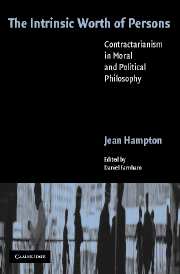Book contents
Foreword by David Gauthier
Published online by Cambridge University Press: 14 January 2010
Summary
To be invited to introduce a selection of Jean Hampton's writings is a great honor. Would though that neither I nor anyone else were to receive it, and that Jean herself were still among us, able to write her own introduction. And if still among us, then still contributing striking ideas and challenging arguments to the never-ending conversation that we call philosophy. I miss Jean. But I am glad to have known her, and because to know Jean was to argue with her, glad to have crossed swords with her in mutually fruitful, constructive confrontation.
Like many moral philosophers of her generation, Jean received the core of her training from John Rawls – an experience that encouraged the development of a Kantian perspective. Kant was certainly one of Jean's philosophical progenitors, but so was Hobbes, and at times one can sense the opposing tugs of each on her thought. And we should not overlook the presence of a third influence, for Jean belonged to the distinct minority of analytic philosophers who are firmly committed Christians. Not that her faith replaces argument in her writings, but it is, I think, easier to appreciate the focus of some of her thinking, especially in one of the finest pieces in this volume, “Mens Rea,” if one is aware of her religious background.
- Type
- Chapter
- Information
- The Intrinsic Worth of PersonsContractarianism in Moral and Political Philosophy, pp. ix - xivPublisher: Cambridge University PressPrint publication year: 2006



